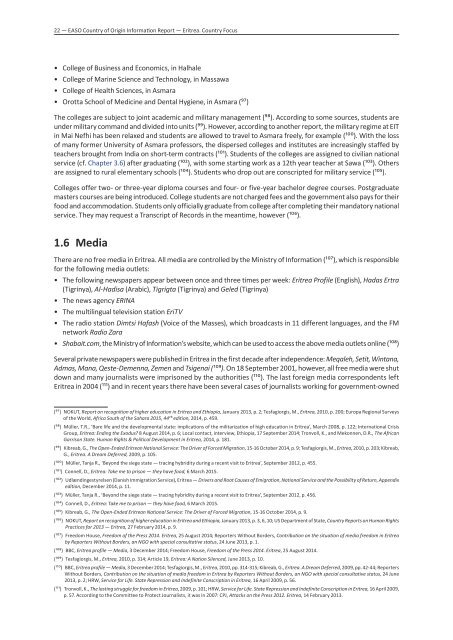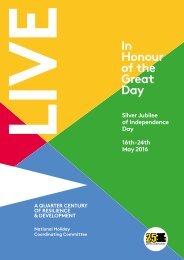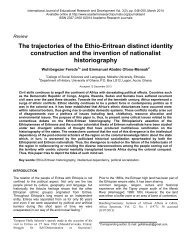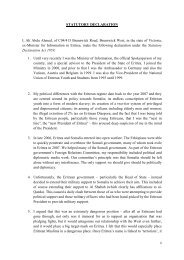You also want an ePaper? Increase the reach of your titles
YUMPU automatically turns print PDFs into web optimized ePapers that Google loves.
22 — EASO Country of Origin Information <strong>Report</strong> — <strong>Eritrea</strong>. Country Focus<br />
• College of Business and Economics, in Halhale<br />
• College of Marine Science and Technology, in Massawa<br />
• College of Health Sciences, in Asmara<br />
• Orotta School of Medicine and Dental Hygiene, in Asmara (97)<br />
The colleges are subject to joint academic and military management (98). According to some sources, students are<br />
under military command and divided into units (99). However, according to another report, the military regime at EIT<br />
in Mai Nefhi has been relaxed and students are allowed to travel to Asmara freely, for example (100). With the loss<br />
of many former University of Asmara professors, the dispersed colleges and institutes are increasingly staffed by<br />
teachers brought from India on short-term contracts (101). Students of the colleges are assigned to civilian national<br />
service (cf. Chapter 3.6) after graduating (102), with some starting work as a 12th year teacher at Sawa (103). Others<br />
are assigned to rural elementary schools (104). Students who drop out are conscripted for military service (105).<br />
Colleges offer two- or three-year diploma courses and four- or five-year bachelor degree courses. Postgraduate<br />
masters courses are being introduced. College students are not charged fees and the government also pays for their<br />
food and accommodation. Students only officially graduate from college after completing their mandatory national<br />
service. They may request a Transcript of Records in the meantime, however (106).<br />
1.6 Media<br />
There are no free media in <strong>Eritrea</strong>. All media are controlled by the Ministry of Information (107), which is responsible<br />
for the following media outlets:<br />
• The following newspapers appear between once and three times per week: <strong>Eritrea</strong> Profile (English), Hadas Ertra<br />
(Tigrinya), Al-Hadisa (Arabic), Tigrigta (Tigrinya) and Geled (Tigrinya)<br />
• The news agency ERINA<br />
• The multilingual television station EriTV<br />
• The radio station Dimtsi Hafash (Voice of the Masses), which broadcasts in 11 different languages, and the FM<br />
network Radio Zara<br />
• Shabait.com, the Ministry of Information’s website, which can be used to access the above media outlets online (108)<br />
Several private newspapers were published in <strong>Eritrea</strong> in the first decade after independence: Meqaleh, Setit, Wintana,<br />
Admas, Mana, Qeste-Demenna, Zemen and Tsigenai (109). On 18 September 2001, however, all free media were shut<br />
down and many journalists were imprisoned by the authorities (110). The last foreign media correspondents left<br />
<strong>Eritrea</strong> in 2004 (111) and in recent years there have been several cases of journalists working for government-owned<br />
(97) NOKUT, <strong>Report</strong> on recognition of higher education in <strong>Eritrea</strong> and Ethiopia, January 2013, p. 2; Tesfagiorgis, M., <strong>Eritrea</strong>, 2010, p. 200; Europa Regional Surveys<br />
of the World, Africa South of the Sahara 2015, 44th edition, 2014, p. 459.<br />
(98) Müller, T.R., ‘Bare life and the developmental state: implications of the militarization of high education in <strong>Eritrea</strong>’, March 2008, p. 122; International Crisis<br />
Group, <strong>Eritrea</strong>: Ending the Exodus? 8 August 2014, p. 6; Local contact, interview, Ethiopia, 17 September 2014; Tronvoll, K., and Mekonnen, D.R., The African<br />
Garrison State. Human Rights & Political Development in <strong>Eritrea</strong>, 2014, p. 181.<br />
(99) Kibreab, G., The Open-Ended <strong>Eritrea</strong>n National Service: The Driver of Forced Migration, 15-16 October 2014, p. 9; Tesfagiorgis, M., <strong>Eritrea</strong>, 2010, p. 203; Kibreab,<br />
G., <strong>Eritrea</strong>. A Dream Deferred, 2009, p. 105.<br />
(100) Müller, Tanja R., ‘Beyond the siege state — tracing hybridity during a recent visit to <strong>Eritrea</strong>’, September 2012, p. 455.<br />
(101) Connell, D., <strong>Eritrea</strong>: Take me to prison — they have food, 6 March 2015.<br />
(102) Udlændingestyrelsen (Danish Immigration Service), <strong>Eritrea</strong> — Drivers and Root Causes of Emigration, National Service and the Possibility of Return, Appendix<br />
edition, December 2014, p. 11.<br />
(103) Müller, Tanja R., ‘Beyond the siege state — tracing hybridity during a recent visit to <strong>Eritrea</strong>’, September 2012, p. 456.<br />
(104) Connell, D., <strong>Eritrea</strong>: Take me to prison — they have food, 6 March 2015.<br />
(105) Kibreab, G., The Open-Ended <strong>Eritrea</strong>n National Service: The Driver of Forced Migration, 15-16 October 2014, p. 9.<br />
(106) NOKUT, <strong>Report</strong> on recognition of higher education in <strong>Eritrea</strong> and Ethiopia, January 2013, p. 3, 6, 10; US Department of State, Country <strong>Report</strong>s on Human Rights<br />
Practices for 2013 — <strong>Eritrea</strong>, 27 February 2014, p. 9.<br />
(107) Freedom House, Freedom of the Press 2014. <strong>Eritrea</strong>, 25 August 2014; <strong>Report</strong>ers Without Borders, Contribution on the situation of media freedom in <strong>Eritrea</strong><br />
by <strong>Report</strong>ers Without Borders, an NGO with special consultative status, 24 June 2013, p. 1.<br />
(108) BBC, <strong>Eritrea</strong> profile — Media, 3 December 2014; Freedom House, Freedom of the Press 2014. <strong>Eritrea</strong>, 25 August 2014.<br />
(109) Tesfagiorgis, M., <strong>Eritrea</strong>, 2010, p. 314; Article 19, <strong>Eritrea</strong>: A Nation Silenced, June 2013, p. 10.<br />
(110) BBC, <strong>Eritrea</strong> profile — Media, 3 December 2014; Tesfagiorgis, M., <strong>Eritrea</strong>, 2010, pp. 314-315; Kibreab, G., <strong>Eritrea</strong>. A Dream Deferred, 2009, pp. 42-44; <strong>Report</strong>ers<br />
Without Borders, Contribution on the situation of media freedom in <strong>Eritrea</strong> by <strong>Report</strong>ers Without Borders, an NGO with special consultative status, 24 June<br />
2013, p. 2; HRW, Service for Life. State Repression and Indefinite Conscription in <strong>Eritrea</strong>, 16 April 2009, p. 56.<br />
(111) Tronvoll, K., The lasting struggle for freedom in <strong>Eritrea</strong>, 2009, p. 101; HRW, Service for Life. State Repression and Indefinite Conscription in <strong>Eritrea</strong>, 16 April 2009,<br />
p. 57. According to the Committee to Protect Journalists, it was in 2007: CPJ, Attacks on the Press 2012. <strong>Eritrea</strong>, 14 February 2013.






